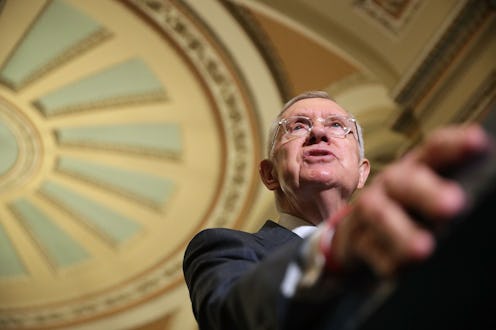News
Reid's Trump Taxes Demand Will Fall On Deaf Ears
In the 15 months since Donald Trump announced his candidacy for president, discussions of his wealth, and how much he's willing to tell us about his wealth have dogged him. Trump remains the only Republican presidential candidate since Richard Nixon to not release his tax returns and disclose his financial ties to the American people. Since the Republican primary, Trump has received bipartisan criticism on this, not just from Democrats and independent news outlets, but even from some notable Republican leaders, as well.
On Tuesday, perhaps the most high-profile call for Trump to release his tax returns came. Harry Reid, the Democratic Senate Minority Leader, made a lengthy speech demanding Trump release his tax returns. He called him a "fraud" and a "swindler." He spent much of the speech focused on a recent series of Washington Post articles detailing how Trump reportedly used other people's money to pay for his Donald J. Trump Foundation, which itself has allegedly engaged in questionable behavior for a supposed charity.
Reid also insisted that Trump is not nearly as rich as he claims he is. He pointed to previous statements by the businessman saying he inflates his wealth as he pleases. "Simply put, Trump is faking his net worth because he doesn't want us to know that he's not a good businessman," the Nevada senator said.
Reid probably meant this as a righteous and angry speech that would shame Trump into finally releasing his tax returns. He had some reason to hope it would work — it did four years ago. In 2012, Reid (then the Senate Majority Leader, and even more powerful) employed the same tactic against Mitt Romney, shaming him for several minutes on the Senate floor, saying that Romney didn't pay federal income taxes and that the Americans deserved to see his returns. "The word's out that he [Romney] hasn't paid any taxes for 10 years," said Reid from the Senate floor.
Reid's claim about Romney's taxes was false. Reid has since admitted it was false, that he knew it was false, and that he still stands by his decision to broadcast that lie from the Senate floor. In a 2015 CNN interview with Reid, the senator said, "Romney didn't win, did he?" And so, watching Reid repeat the explicitly underhanded tactic makes all the worthwhile attempts at shaming Trump into releasing his taxes lose a little credibility.
For months, many prominent conservative commentators, political operatives, and elected officials have faulted Trump's lack of disclosure as one of the many reasons they cannot stomach supporting their party's nominee. But even as the #NeverTrump group had joined with Democrats in their distaste for Trump's lack of disclosure, they are nevertheless finding themselves reminded of how pissed off Reid makes them.
In this extremely divisive election, one of the most interesting things to me has been the strange alliance between Republicans frustrated by Trump's takeover of their party and Democratic leaders trying to prevent him from doing the same to the country. In reminding strange bedfellows of the animosity they usually share, Reid may have hurt his cause's unexpected unity. And it is highly doubtful he made it more likely for Trump to release his taxes.
